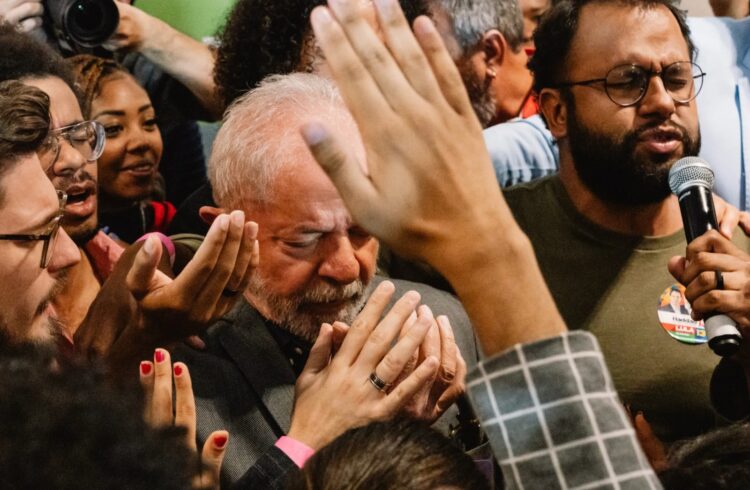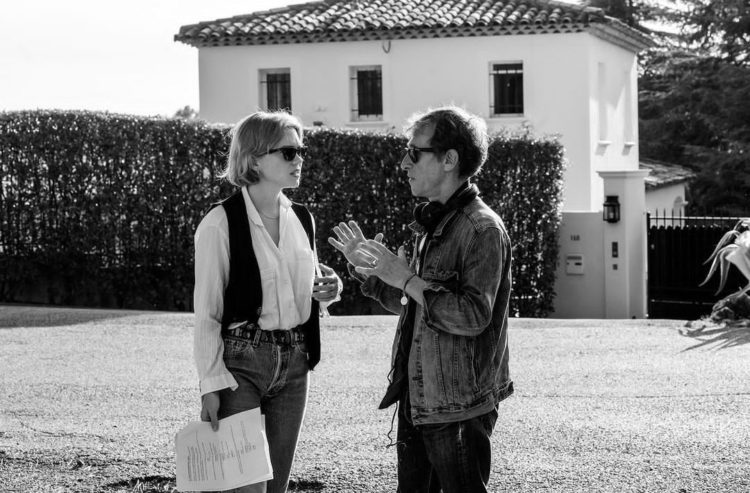

Five years, the closest presidential election in Brazilian history, and one insurrection after her last examination of Brazil’s tumultuous socio-political sphere, Petra Costa––the brilliant documentarian behind Elena and The Edge of Democracy––hones in on Jair Bolsonaro, the radical evangelical right that won him the presidency in 2018, and the theocracy they collectively fight to instate. With Costa’s nearly unfettered access to the main characters of modern Brazilian politics, the events of Apocalypse in the Tropics practically unfold in real time––a thrilling, profound documentary horror.
Costa’s third solo feature presents Brazil as a perfectly bottled representation of what’s happening across an ever-globalizing world. It captures the trending rise of a new political right defined not by their specific beliefs but an amorphous fanatic religiosity and the spiritual, existential entitlement that comes with it, forcing all rational parties and critical thinkers to fight for democracy under a people-first, anti-theocratic (but ultimately areligious) left. It’s one thing for people to practice faith without harming others; it’s another entirely when people infuse their faith into the hope for a punishing political system that re-weds church and state. Though it’s far from unfamiliar in church history.
Leaving Rio de Janeiro, the modern National Congress of Brazil found its home in the newly created federal capital of Brasília in 1960. Congressional buildings were thoughtfully reimagined and centralized across the wide-open landscape to liberate and democratize a Brazil that has since voted in and out a military regime, one of the most liberal governments in the world, and Bolsonaro, who ran on an ultra-right platform that guaranteed (just naming to examples) the savage “reclamation” of Indigenous land and placing guns in every home.
Following Bolsonaro, his base, the public, and current and third-term President Luiz Inacio “Lula” da Silva––whose past administrations’ crimes don’t pale in comparison to the proud criminal behavior touted by Bolsonaro and his fundamentalist goons––Costa’s face-to-face proximity to everyone involved makes Apocalypse worth the watch alone. In no time at all, one of the film’s headlining questions emerges: who would Bolsonaro––a figurehead first, thinker second––be without his evangelical pedestal?
Before receiving a game-changing evangelical endorsement, Bolsonaro was a low-ranking, ultra-right politician who always ran to the nearest camera or microphone to stoke a fire. Without the endorsement of militant evangelical web-tyrant Silas Malafaia, Bolsonaro wouldn’t have stood a chance in the 2018 race. It also helped that Bolsonaro survived a stabbing in a large crowd, after which his near-martyrdom and survival was hailed a miracle by Malafaia and the religious right, rallying military men to protect him and on-the-fence followers to lend him their vote.
His presidency was a wreck. Post-victory, the country was suffering amidst COVID, and instead of buying vaccines and addressing the issue medically, Bolsonaro and Malafaia held a press conference to instruct its people to fast and pray. While they ate like kings in the safety of their mansions, the country climbed to the second-largest death toll in the world from COVID, losing over 700,000 lives. The cause of death for many, who sought help at defunded medical facilities (their only options), was simply “lack of assistance.”
But let’s take a step back––who is Silas Malafaia? For starters, arguably Costa’s main subject.
Imagine Joel Osteen, Joseph McCarthy, Billy Graham, Trump, and a witch-burning Puritan pastor all rolled into one garbage sludge of a human being (humanity not confirmed): that’s Silas Malafaia. Or as Costa identifies him: The Kingmaker. He is the epitome of both ecclesiastical and political manipulator, his core “beliefs” erratically flip-flopping over the years based on where he could get his foot in the door. His wavering history of endorsements is a damning indictment of what he values: power, wealth, and the subjugation of people to his authority––not God’s, whatever he’d have you believe.
In incriminating interviews, Malafaia makes it abundantly clear that if it were up to him / Christ, Brazil would be a theocracy founded on dominionism, which holds that the church should rule all elements of culture, economy, and government with an iron fist. Of all the access Costa was granted, her time with Malafaia is by far the most illuminating and unrestricted. The pugnacious pastor is so indignant toward everyone about everything that he doesn’t realize he’s voluntarily saddled up on the back of his enemy to strengthen a project that derides him. Costa and crew don’t need to do anything to make their case but point the camera in Malafaia’s direction, an act that bolsters his vanity to the point of blindness.
There are too many noteworthy scenes with him to mention, but one of the most revealing takes place in the car, where his Pentecostal road rage reigns supreme as he spit-rants about following a Jesus that flipped tables and beat people (the latter of which simply does not happen in the Bible). And why did Jesus flip tables? Because people turned the church into a marketplace, arguably one of Malafaia’s greatest, most vile achievements (via televangelism, now turned digital). He ups the ante on his private jet, complaining to the camera about its depreciation because of how often he uses it, counting that among many sacrifices for the church.
Costa, in tracing the rise and fall and rise of the zealous far-right in Brazil, doesn’t implore you to trust her or suspend your disbelief. She takes a much more thorough approach, delivering a documentary overflowing with research––social, theological, historical, and political. Several statistics made me sit up in my seat. Speaking as one with two degrees in theological studies––an academic arena where truly unbelievable church history and accompanying statistics are boundless––that’s saying something.
One in particular has been ringing in my head for days now: Brazilian people have gone from 5% Christian to more than 40% Christian in the 21st century. It’s a bone-chilling reality when you consider their values. And even more chilling when you realize how they act on them. After all, these are the people who committed an insurrection much more destructive than our own. Another? At the time of filming, the Evangelical Caucus was 142 strong––around five times its size in the mid-aughts, giving ample weight to the evangelical cause in congress.
In the film’s final section, Costa gets eschatological, taking a deep dive into the hellish book of Revelation on which fire-and-brimstone believers base the hope for a new world in which violently conquering their enemies is a necessary evil to combat the greater evil of said enemies’ non-belief. She unpacks the end-times theology of contemporary Brazilian evangelicals from the traditional fundamentalist perspective they share, namely that of John Nelson Darby. In the early 19th century, Darby made waves in the church and a name for himself by interpreting Revelation (relatively) anew: literally.
Parsing the Bible’s final book, Darby believed a seven-year period of infernal rapture would take place on Earth before the ultimate second coming of Christ. Thus he taught that the worse things got on Earth for non-believers, the more likely it was that humanity was already immersed in the rapture, bringing Christians ever-closer to the second coming of Christ. Ergo a Christ-follower, per Darby, should not create peace or reduce suffering or stand up for the oppressed or prioritize love, as Jesus taught. Rather, they should mercilessly distinguish themselves by faithfully contributing to the tribulations of non-believers so that Jesus might come in their lifetime.
Fast-forwarding a century, Costa makes a further connection to Billy Graham, spotlighting the American evangelical movement’s influence on the popular Brazilian Christian politics of today. She takes it back to 1974, when Graham visited Rio de Janeiro to chase away democracy as soon as it arrived, for fear of the ghosts of communism and Marxism.
While the Liberation Theology movement gained ground in Latin American Catholicism, swimming upstream against harmful and dehumanizing Christian beliefs in the name of a love-first, others-first, pacifistic faith practice, Protestant Evangelicalism in America grew in the opposite direction, getting in bed with presidents and their cabinets, heads of industry, and media giants that could put them on TV to ask for money every goddamned day of the week. As Costa presents it, this was (and is) theological colonialism, embraced by a people in need of hope who have now written it into religious stone.
Brazil has its own unique identity and trajectory, but the degree to which the country and its leaders have taken confidence, inspiration, and literal next steps from Trump’s galvanization of an American far-right can’t be emphasized enough. They have the privilege of seeing how things work out first in the U.S. so they can course-correct to more effective action in their home country.
Their insurrection was much worse than ours, and it came only three years later, two days after the US anniversary, on January 8th, following Bolsonaro’s (empty) announcement that he wouldn’t respect an election he subsequently lost to Lula. Sound familiar? The footage, however, is very different from America’s––an eerier kind of freaky.
These zealots aren’t shirtless incels dressed in pelts and horns or homebody suburbanites obsessed with Q. They’re plain conservative evangelical Christian families. They shatter the windows of congress and rip apart its innards while singing worship songs, eventually gathering in large groups on their knees to pray with an ironic, self-pronounced humility, tears of triumph rolling down their faces. It’s a more diverse, wide-ranging group of Brazilians than it was Americans, and a much more religious crowd, despite what many American insurrectionists claim.
Costa explains where modern Brazilian evangelicals are coming from––much to our horror––but she does it in a way that inspires fury toward the leaders of the religious right more so than its congregants, the latter puppeteered any which way for the sake of the former’s wealth and stature. It’s a tale as old as church history itself, and one taking a newer, uglier face in the age of the Internet and waning democracies.
The Edge of Democracy––Costa’s last film, for which she won a Peabody––more or less predicted the atrocities that have taken place in the five years since. If Apocalypse lands on a similarly accurate note, the future of Brazil––and the many countries that mirror it––is a frightening one. But there’s still plenty of hope. Lula’s 2022 re-election is proof enough. Above all, Costa implores us to understand one thing: in the face of evil, it’s never too late for change.
Apocalypse in the Tropics screened at the 62nd New York Film Festival.
The post NYFF Review: Apocalypse in the Tropics is an Exposé of Brazil’s Politically Active Religious Right first appeared on The Film Stage.



